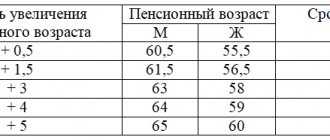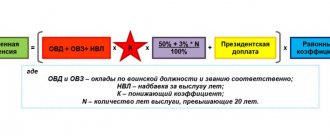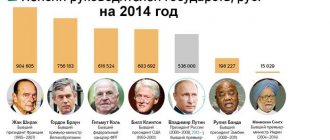Most often, people retire when they reach a certain age.
Every citizen of the Russian Federation must pay state benefits in old age, but recently the size of this payment directly depends on the person himself.
From our material you will find out whether it is worth transferring the funded part of your pension to a non-state pension fund.
Since 2002, a law came into force that radically changed the entire pension system in the country. Citizens must receive support from funds that the employer contributed to the Pension Fund of the Russian Federation throughout their entire working career (No. 173-FZ of December 17, 2001). From the moment of the reform to the present day, amendments have been systematically made to the law.
Contribution structure for future old age benefits
Today, the provision is formed from mandatory contributions paid by the employer as a percentage of wages, as well as voluntary contributions from citizens to the account of their future pension.
The employer is obliged to transfer 22% of wages to the Pension Fund on a monthly basis.
These funds are distributed as follows:
- 16% goes to the insurance pension account.
It is formed according to the insurance principle, and is payable when grounds for retirement arise. The insurance share is formed only from funds paid by the employer. - 6% – funded part.
A citizen has the right to dispose of savings funds at his own discretion within the framework of the law, and it can also be increased through additional contributions.
Since 2014, a moratorium has been introduced on the formation of pension savings in the Pension Fund , contributions are automatically transferred to insurance. A citizen has the right to transfer savings to a non-state pension fund (how to transfer a private private enterprise from the Pension Fund to the Non-State Pension Fund?).
Reference. If a person has not entered into an appropriate agreement with a non-state pension fund, all money is accumulated in accounts in the pension fund and is subject to annual indexation by the state by the percentage of inflation.
Detailed description of the procedure
A personal account is maintained by the Pension Fund of the Russian Federation for each person who works. Account maintenance is regulated by Federal Law effective April 1, 1996 N 27-FZ. About “individual accounting in the field of compulsory pension insurance.”
A person who has SNILS can check at any time whether his employer is making insurance contributions correctly.
The savings insurance procedure involves the following actions:
- drawing up a written notification for the state pension fund.
- Selecting the insurance company where the funds will be transferred (the name of the company must be indicated in the notification).
- Awaiting confirmation from the state pension fund.
- Subject to confirmation, you enter into a special contract with a private insurance company.
- After careful verification and signing of the agreement, your funds are transferred to a new personal account.
- Storing funds in this account provides for additional interest.
Cumulative part of pension
It is savings contributions that are of greatest interest to citizens. The savings part represents savings in a person’s separate account.
Its value will be an increase to the pension upon reaching the right to it.
Until 2014, these funds were generated in the accounts of the Pension Fund.
After changes are made to the legislation (Federal Law on funded pensions, Article 18), savings are automatically transferred to the insurance share account, however, a person has the right to send this amount to a non-state pension fund.
A person can independently increase savings by additionally transferring money to the appropriate account. The funded part can be inherited. This can be very beneficial for the future of a particular person.
Is it necessary to transfer it to a non-state pension fund and why should this be done?
Here we will tell you in more detail whether it is necessary to transfer contributions to a non-state pension fund and why this should be done? Since 2014, the so-called non-state pension funds have received the right to manage savings (Law No. 410-FZ of December 28, 2013). These are organizations that manage savings funds without access to the personal accounts of their owners. Non-state pension funds can invest money in securities, various projects to receive income, etc.
Such institutions are interested in the money generating income, since they receive their commission from the profits received and some bonuses from the state.
Thus, the income of a non-state pension fund directly depends on the growth of savings in the accounts of its depositors.
The law does not oblige citizens to transfer their pensions to such funds.
However, NPF has a number of advantages over a government institution:
- the opportunity to significantly increase payments compared to the Pension Fund.
With a competent approach to choosing an institution, a citizen can significantly increase his social future. security. In addition, most funds give their investors the opportunity to receive savings in a lump sum upon reaching retirement age (the Pension Fund of the Russian Federation sets a limit on this type of payment). - High service.
Account holders can monitor their status at any convenient time online. - Unchangeable conditions.
By entrusting funds to non-state companies, a person enters into an agreement that provides uniform conditions throughout the entire period of its validity. - Guaranteed safety of funds.
The money is insured and subject to return even in the event of bankruptcy of the NPF.
Reference. If you are not satisfied with the work of the fund, you can always terminate the contract and transfer the funds to another institution.
Thus, in order not only to retain your funded pension, but also to significantly increase its size, it is better to entrust your savings to a non-state pension fund.
Every employee dreams of receiving a decent pension, the amount of which will fully satisfy monthly needs. However, not all clients of Sberbank, VTB 24, Gazprombank and other banks know about the savings program, which allows them to save money “for the future” for a long time. How to apply for and receive an NPP in a non-state pension fund and in Rosgosstrakh - read in our materials.
Responsibilities of the Agency
Non-state pension funds that have been accredited form a guarantee insurance system. Its participants transfer contributions to the Agency's account within the established period, and their amount is determined as a percentage of existing assets.
If a non-state pension fund experiences delays in payments or its license is revoked, it must contact the Agency (in some cases no official application is required), which takes responsibility for the actions of the fund and makes current payments for it.
All NPFs that have refused to join the guarantee system or whose activities do not meet the requirements set by the Pension Fund of the Russian Federation, from the beginning of 2020, are required to transfer the pension savings of citizens to the state fund and cease their activities.
What do you need to know when making a practical choice?
Some of the working practical recommendations include the following:
- Do not go where the percentage of promised profit is much higher than the market average. Here scammers try to play on the client’s feelings of greed.
- View reviews online. If the reviews are only good, this should be alarming. Most likely, this is all falsification.
- Carefully check the company details, which should be freely available in the NPF register. This can be done on the official website of the Pension Fund. If the register does not contain any information about the non-state pension fund of interest, then there is a high probability of the illegal origin of this enterprise.
- Prefer large, well-known financial organizations to small private associations. In large companies, income may be slightly lower, but the security that the insured person will actually receive his money upon reaching retirement age is ten times higher (how to receive your funded part of a pension from a non-state pension fund is discussed here).
Do you want to transfer the funded part of your pension to a non-state pension fund? Then you need to pay special attention to the choice of organization. On our website you can find detailed information about the programs and conditions of such non-state pension funds as VTB-24 and Sberbank.
OPS agreement with NPF
To transfer the funded portion from the Pension Fund to a non-state fund, it is necessary to conclude a Compulsory Pension Insurance (OPI) agreement. A new agreement is also concluded when transferring funds from one NPF to another. You can change the management company once per calendar year by sending a corresponding application through your personal account or the State Services portal to the address of the territorial office of the Pension Fund before December 1.
You only need to have two documents with you: a passport and SNILS.
- How to remove ads in the Opera browser
- New rules for awarding the title “Veteran of Labor”
- Russia may legalize “quiet hour” during the daytime
When transferring funds more than once every 5 years, the accrued interest is lost unless other conditions are specified in the Agreement. The endowment insurance agreement has a standard form approved by the Central Bank of Russia. When signing the Agreement, it is important to consider a number of points:
- The agreement is concluded with only one non-state fund. All NPFs are accredited. Information about them is entered into a special register. You can view the list on the website of the Central Bank, the Pension Fund or the Deposit Insurance Agency.
- The choice of an insurer is an individual decision of the citizen himself. Before signing a document, you need to pay attention to the reputation of the fund, its ratings, and liability measures.
- When submitting an application to the Pension Fund, there is a 20-day cooling-off period. During this time, the future pensioner can unilaterally refuse to transfer funds to the NPF and terminate the agreement without loss of investment income.
- In the event of the death of the policyholder, all of his pension savings are inherited in accordance with the law , unless the Agreement contains an indication of a legal successor.

Guaranteeing the rights of insured persons
According to Law No. 422-FZ (December 28, 2013), guaranteeing the rights of persons insured in the compulsory health insurance system is a special state program. The main goal is safety, security and return of pension savings to citizens. Protection of client rights is carried out at two levels. In the event of an insured event, payments will be made through:
- internal reserves of member funds and Pension Funds;
- a specially created National Fund through the Deposit Insurance Agency.

Insurance cases
The DIA assumes the obligation to return all pension savings and guarantees payment of the full amount of savings, with the exception of investment income received. Insured events arise if:
- The NPF has been declared bankrupt and bankruptcy proceedings have been opened against it.
- The amount of the PFR reserve for compulsory insurance, which ensures the sustainability of fulfillment of obligations to policyholders, becomes below the minimum threshold.
- The Fund has been deprived of a license to carry out activities in pension insurance and provision.
- The NPF has recorded a lack of funds to pay the due amount to the policyholder.
Is it necessary to transfer to a non-state pension fund?
This is a rather subjective question and must be answered based on the wants and needs of the account holder. As such, there is no obligation to transfer the funded part of the pension to a non-state pension fund. And if you do not take care of your future savings on your own, the state will take this issue upon itself and transfer all available funds to a controlled organization, where the capitalization from the circulation of money will be somewhat less.
If you transfer your funded pension account to a non-state pension fund, then there is a real chance that you will end up with a significantly larger amount than the state can offer. Read about how to make a transfer in our material.











